
Everybody has a role to play in preserving/improving the quality of water in the Estero River, Halfway Creek, and Estero Bay. If each of us do our part, we can get their water quality back to where it needs to be. There are some simple practices each resident can incorporate into our daily routines that will prevent pollutants from entering and harming our waterways.
Following are some suggestions. If you know of others please, let us know and we will add them to our list.
Yard Maintenance
 Consider implementing Florida Yards and Neighborhoods Homeowner Program practice into your own yard. These practices will help conserve water, require less fertilizer and require less maintenance.
Consider implementing Florida Yards and Neighborhoods Homeowner Program practice into your own yard. These practices will help conserve water, require less fertilizer and require less maintenance.
Following are some resources.
Florida Yards & Neighborhoods Handbook.
https://ffl.ifas.ufl.edu/materials/FYN_Handbook_2015_web.pdf
The Florida Friendly Landscaping Guide to Plant Selection & Landscape Design.
https://ffl.ifas.ufl.edu/pdf/FYN_Plant_Selection_Guide_2015.pdf
Use the following best management practices to help reduce your impact on the environment
- Do not apply fertilizers during the months of June – September as it is typically not needed and will often just runoff with the afternoon rain showers.
- Only apply fertilizers when rainfall is not in the forecast. If it rains the fertilizer will be carried off your lawn and end up fertilizing our rivers and creeks.
- Keep Grass Tall. Set your mower deck at 3 inches. This will promote a stringer more resilient lawn with deeper roots. Reducing the fertilizer and irrigation needs.
- Keep grass clippings on the lawn; clippings act as a natural fertilizer and should be kept out of our stormwater systems.
- Don’t over irrigate. Too much water will weaken your lawn and require more irrigation. Irrigate enough to keep lawn alive but it doesn’t have to be bright green all dry season.
- Don’t irrigate during the summer. We get enough rain for your lawn and landscaping.
- Irrigate only during allowed times:
Odd street addresses may irrigate lawns and landscapes on Wednesdays and Saturdays from 12 a.m. to 10 a.m. and/or 4 p.m. to 11:59 p.m.
Even street addresses may irrigate lawns and landscapes on Thursdays and Sundays from 12 a.m. to 10 a.m. and/or 4 p.m. to 11:59 p.m.
Septic Tanks
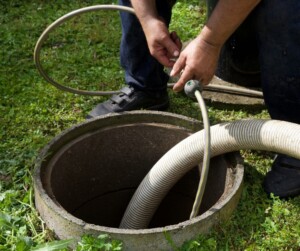 Pump your tank every 4 to 5 years.
Pump your tank every 4 to 5 years.- Avoid “flushable wipes.” These are four times thicker than toilet paper.
- Protect your drain field.
- Keep water away from the drain field. Direct stormwater away
- Don’t park on the drain field. This compacts the drain field reducing its effectiveness.
- Only install appropriate plantings over the drain field. No plants with deep roots that could ruin the drain fields.
- Don’t overload the system. Distribute your laundry loads over the week to prevent a system overload.
- Don’t dump household chemicals down the drain. Many household chemicals will harm the organisms in your septic tank that treat the waste.
- Conserve water. Your septic tank will function better when it has to treat less water.
- Consider working with The Village of Estero and your utility provider to switch from septic tank to central sewer.
Pets/Wildlife
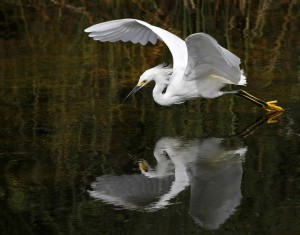 While it may seem like a small part, pet waste can contribute to pollution. Improper disposal of pet waste can add excess nutrients and bacteria to the environment. In some locations pet waste has been identified as the major contributor to unsafe levels of bacteria in lakes and streams.
While it may seem like a small part, pet waste can contribute to pollution. Improper disposal of pet waste can add excess nutrients and bacteria to the environment. In some locations pet waste has been identified as the major contributor to unsafe levels of bacteria in lakes and streams.
Make sure to pick up all pet waste and put it in the trash. If left in the elements, stormwater will take the pet waste (including its high levels of nutrients and bacteria) to our lakes and streams.
Don’t feed wildlife, especially near ponds, lakes, and streams. Attracting a large amount of wildlife to one location can lead to an increase in nutrients and bacteria level from wildlife waste. This can contribute to the pollution of our lakes and streams.
Car Washing
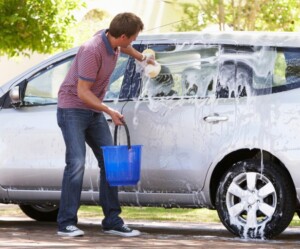 Use Commercial Care Washes – water from commercial cares washes is recycled or sent to wastewater treatment plans. Pollutant water is kept out of lakes and streams.
Use Commercial Care Washes – water from commercial cares washes is recycled or sent to wastewater treatment plans. Pollutant water is kept out of lakes and streams.- Don’t waste the water. Turn off the hose while not rinsing the care.
- Water your lawn. Wash your care on the lawn so the water can clear your car and water your lawn. Also prevents some of the detergent and dirt from getting into the stormwater.
- Use phosphate-free soap.
Household Hazardous Waste/Prescription Drugs
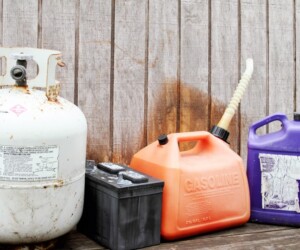 Take any household chemicals to a Lee County Household Chemical Waste Collection facility. Where it will be accepted and disposed of free of charge.
Take any household chemicals to a Lee County Household Chemical Waste Collection facility. Where it will be accepted and disposed of free of charge.
Illicit Discharges
Illicit discharges are defined as anything other than stormwater and stormwater runoff into a drainage system as prohibited by the Village as outlined in Village Ordinance No. 2020-08.
Only stormwater should discharge to any drainage system. Other discharges can have chemicals and pollutant that will harm the drainage system as well and the Village’s natural water bodies.
Identifying Illicit Discharges
Illicit discharges can take many forms. It can include a non-stormwater pipe that discharges to a drainage system or chemical/materials that are exposed to rainfall and become part of stormwater runoff.
A few specific examples of illicit discharges include:
- Construction site discharges (dirt)
- Industrial/Commercial facility discharges
- Septic system failures
- Gray water discharges (washing machine, sinks, etc.)
- Improper use of fertilizer/herbicide/pesticide
- Pressure wash water with added chemicals
- Pressure wash water used to clean up chemicals
- Any pollutant left outside that may be carried off by stormwater
It is not possible to list all potential illicit discharges, so if you think it might be an illicit discharge, let the Village of Estero know so we can help make the determination. Illicit discharges can either be reported to the Village by using the request for action or calling 239-221-5035.
Reporting Illicit Discharges
If you see anything discharging into a swale, ditch, pipe, drainage inlet, creek, river of lake that you suspect is not coming from rainfall or stormwater runoff please report it to the Village of Estero at Public Works Request for Action or 239-221-5035 or. We will check on it and determine if it an allowable or illicit discharge. If it is an illicit discharge, we will work to get it stopped.
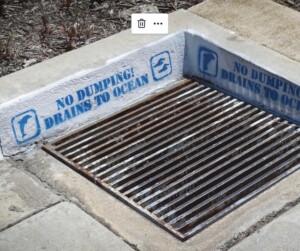
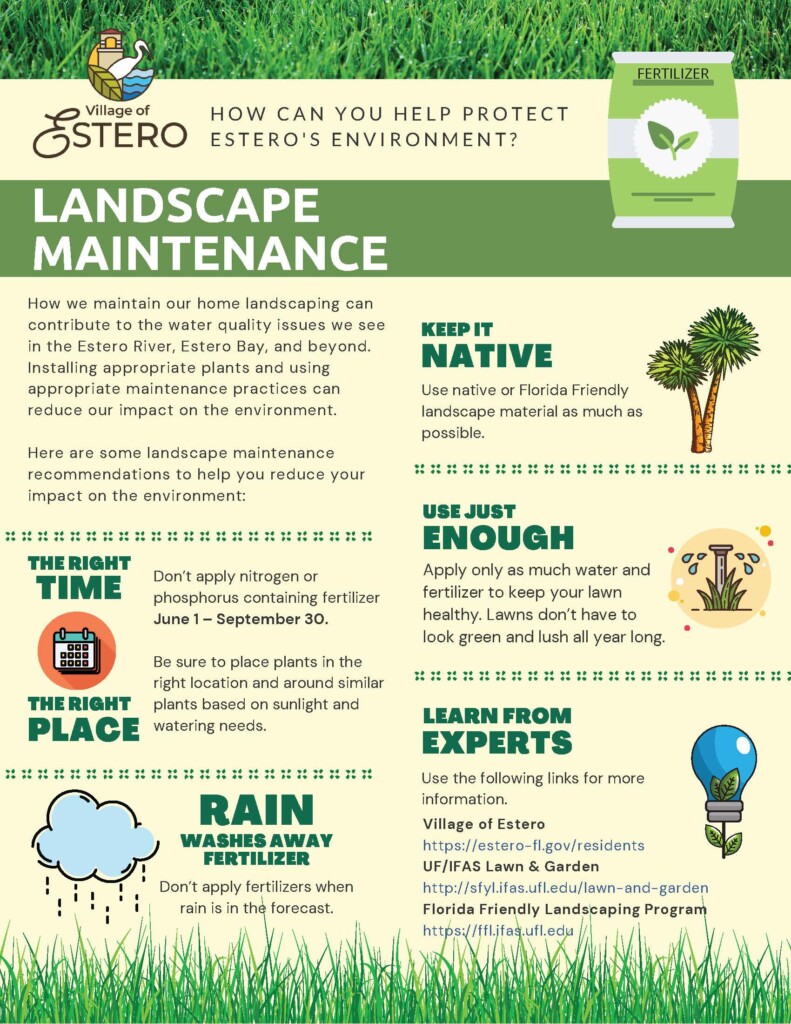
![How-Homeowners-can-help-the-Environment[1] How homeowners can help the environment](https://estero-fl.gov/wp-content/uploads/2022/12/How-Homeowners-can-help-the-Environment1-791x1024.jpg)
![Illicit-Discharges[1]](https://estero-fl.gov/wp-content/uploads/2022/12/Illicit-Discharges1-791x1024.jpg)